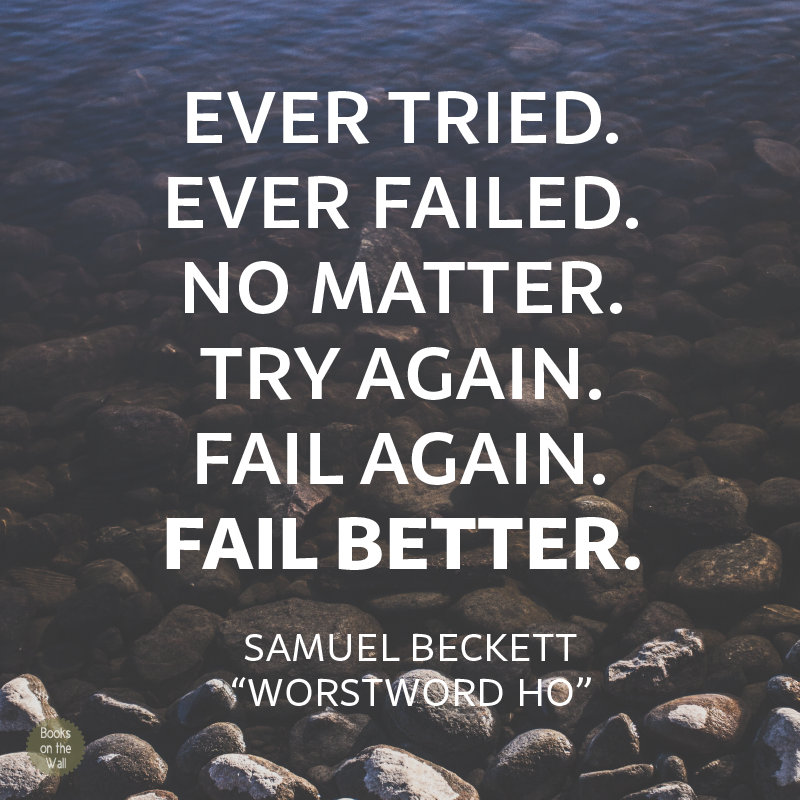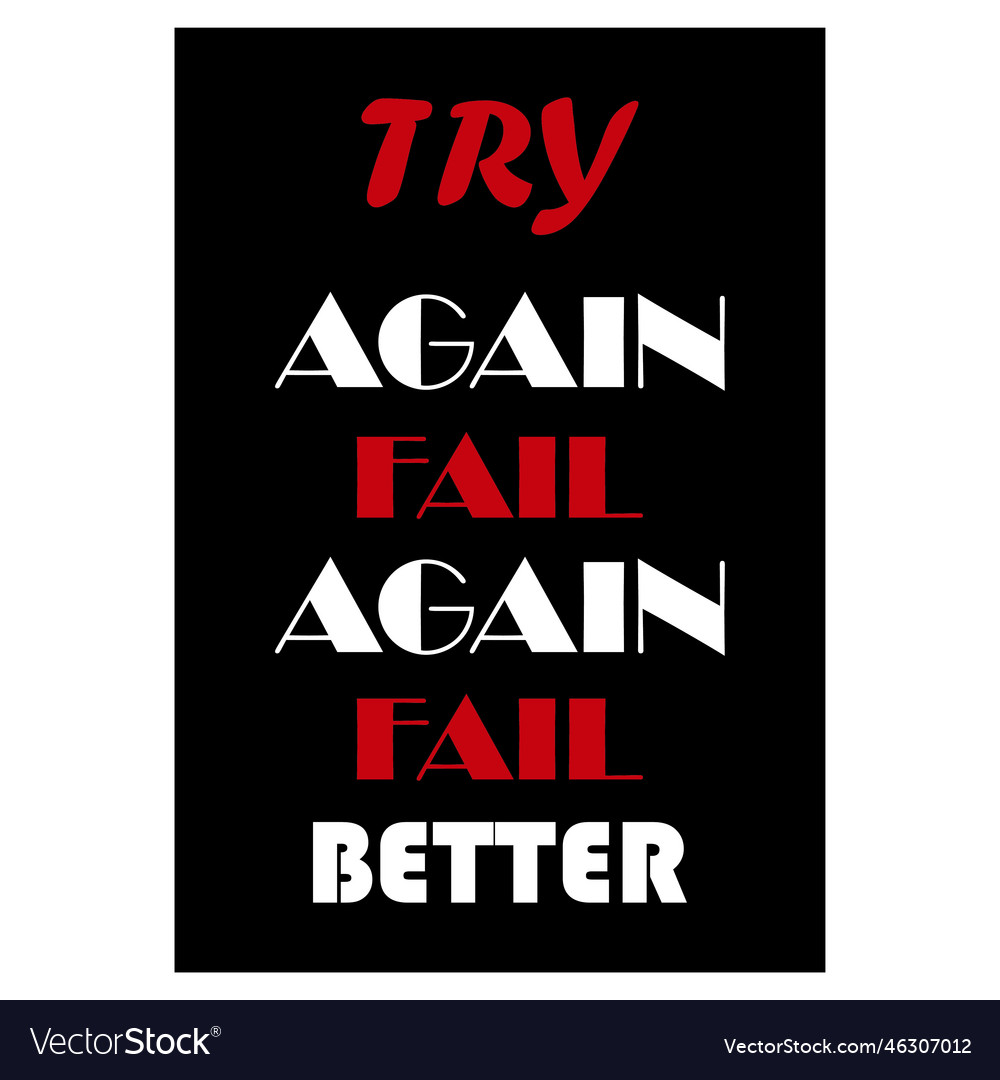[

Why you should try again after every fail?

Executive Summary

Failure is an inevitable part of life, a harsh teacher, but ultimately, a powerful catalyst for growth. This article delves into the profound reasons why embracing failure and attempting again after setbacks is not merely advisable, but essential for achieving your goals and cultivating resilience. We’ll explore the psychological, emotional, and practical benefits of perseverance, offering strategies to overcome the sting of defeat and transform failure into a stepping stone to success. By understanding the nature of failure and adopting a growth mindset, you can unlock your full potential and build a more fulfilling life.
Introduction
We live in a society that often glorifies success and shuns failure. But the truth is, every successful person has experienced countless failures along the way. Failure isn’t the opposite of success; it’s a necessary stepping stone. This article aims to shift your perspective on failure, transforming it from a source of shame and despair into an opportunity for learning, growth, and ultimately, achieving your aspirations. Learning to navigate failure is a skill that, once mastered, will empower you to overcome any obstacle and achieve remarkable things.
Frequently Asked Questions
- Q: What if I’ve failed multiple times at the same thing? Should I just give up?
A: Absolutely not! The number of times you’ve failed doesn’t diminish the value of trying again. Analyze why you failed each time. Identify recurring patterns, adjust your approach, and try a new strategy. Persistence, coupled with self-reflection, is key. Giving up prematurely robs you of the potential for success.
- Q: How can I overcome the emotional impact of failure?
A: Failure often triggers negative emotions like disappointment, frustration, and self-doubt. Acknowledge these feelings, allow yourself to process them, but don’t let them define you. Practice self-compassion, celebrate small wins along the way, and focus on the lessons learned. Seek support from friends, family, or a therapist if needed.
- Q: Isn’t it better to avoid failure altogether by playing it safe?
A: While avoiding risk might seem appealing, it also limits your potential for growth and significant achievement. Stepping outside your comfort zone and embracing calculated risks is crucial for personal and professional development. Failure, while uncomfortable, offers valuable lessons you can’t learn anywhere else. Safe choices often lead to a life of unfulfilled potential.
The Power of Resilience
Resilience, the ability to bounce back from adversity, is a crucial component of success. It’s not about avoiding failure, but about your response to it.
- Embrace the learning curve: Every failure is a learning opportunity. Analyze what went wrong, identify your mistakes, and adjust your strategy accordingly. Treat each failure as a valuable data point.
- Develop a growth mindset: Believe that your abilities and intelligence can be developed through dedication and hard work. See setbacks as opportunities for improvement rather than evidence of inadequacy.
- Cultivate self-compassion: Treat yourself with kindness and understanding. Failure doesn’t mean you’re a failure; it means you’re trying. Forgive yourself for your mistakes and move forward.
- Seek support: Don’t isolate yourself when you fail. Talk to trusted friends, family, or mentors. Sharing your experiences can provide valuable perspective and emotional support.
- Celebrate small wins: Acknowledge and celebrate your progress, no matter how small. This will boost your morale and keep you motivated to persist.
- Visualize success: Visualizing yourself achieving your goals can enhance your motivation and confidence. Picture yourself overcoming obstacles and achieving your desired outcome.
Reframing Your Perspective on Failure
Failure is often viewed negatively, but a reframed perspective can be transformative.
- Failure as feedback: View failure not as an ending, but as feedback. What information does your failure provide about your approach, strategy, or even your goals themselves?
- Embrace discomfort: Growth occurs outside of your comfort zone. Failure inherently involves discomfort, but it’s within that discomfort that true learning and development take place.
- Shift your focus from outcome to process: Instead of fixating on the outcome, focus on the process. Did you put in the effort? Did you learn something? This shift in focus can alleviate pressure and promote resilience.
- Identify and eliminate limiting beliefs: Do you hold any negative beliefs about your abilities or potential? Identifying and actively challenging these beliefs is vital for fostering a growth mindset and overcoming the self-doubt that can accompany failure.
- Develop a plan for recovery: Having a structured plan for how you’ll react and recover after a setback can significantly reduce stress and promote a sense of control.
- Focus on progress, not perfection: Perfection is an unattainable ideal. Celebrate progress and milestones along the way.
The Importance of Persistence
Persistence is often the difference between success and failure. It’s the unwavering commitment to keep trying, even in the face of setbacks.
- Set realistic goals: Setting achievable goals makes the journey less daunting and provides smaller wins to celebrate along the way. Breaking down large, overwhelming objectives into smaller, manageable steps will make the process more sustainable.
- Develop a strong support system: Surrounding yourself with supportive and encouraging individuals will provide motivation and guidance when facing challenges.
- Practice mindfulness: Mindfulness helps you stay present and focused on the task at hand, rather than being consumed by fear of failure or dwelling on past mistakes.
- Learn from your mistakes: Each failure offers invaluable lessons. Analyze what happened, identify areas for improvement, and adapt your strategies accordingly. Documenting your mistakes can be a powerful tool for growth.
- Maintain a positive attitude: A positive mindset fosters resilience and keeps you motivated, even during setbacks. Focus on the potential for success, rather than dwelling on potential failures.
- Track your progress: Monitoring your progress, however small, can provide a sense of accomplishment and reinforce your commitment to your goals.
Building Resilience Through Action
Resilience isn’t an innate trait; it’s a skill that can be developed and strengthened over time.
- Challenge negative self-talk: Become aware of and challenge negative thoughts and self-criticism. Replace them with positive affirmations and realistic self-assessment.
- Practice self-care: Prioritizing your physical and mental well-being is crucial for resilience. Engage in activities that help you relax, de-stress, and recharge.
- Seek mentorship: Mentors offer invaluable guidance, support, and perspective. They can share their own experiences with failure and provide strategies for overcoming challenges.
- Develop coping mechanisms: Identify and practice healthy coping mechanisms for dealing with stress and setbacks. This might include exercise, meditation, spending time in nature, or creative pursuits.
- Embrace failure as a teacher: Instead of viewing failure as an enemy, consider it a valuable teacher. Learn from your mistakes and use that knowledge to improve your future attempts.
Conclusion
The path to success is rarely linear; it’s paved with setbacks and failures. However, by reframing your perspective, cultivating resilience, and embracing persistence, you can transform failure from a debilitating experience into a powerful catalyst for growth and achievement. Remember, it’s not about avoiding failure, but about your response to it. The ability to learn from your mistakes, adapt your strategies, and try again is a hallmark of truly successful individuals. Embrace the journey, celebrate the small wins, and never underestimate the power of trying again after every fail. Your perseverance will pave the way to a more fulfilling and successful life.
Keyword Tags
Failure, Resilience, Perseverance, Growth Mindset, Success
]

